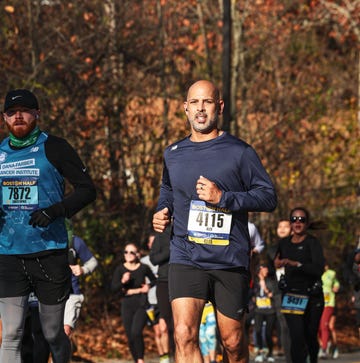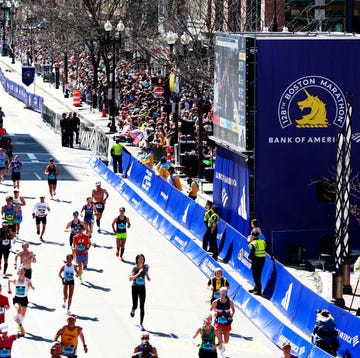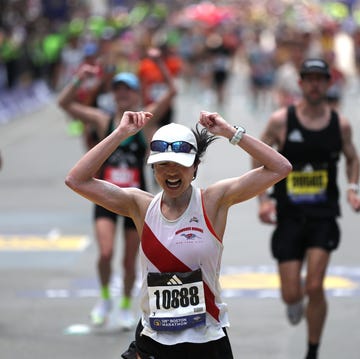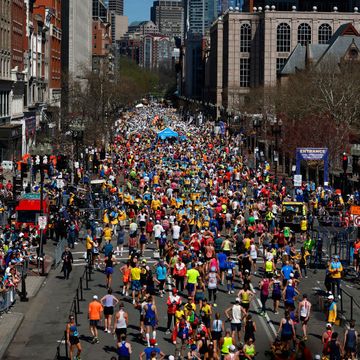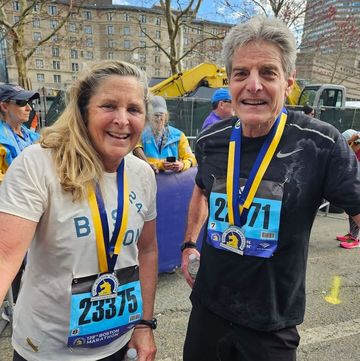I am looking at a photo taken of myself in Hopkinton, Massachusetts, last April 15, in which I am running next to William Greer of Austin, Texas. In the picture, William is looking off to the side, which he often did, because he is legally blind. I am wearing a race bib that says GUIDE, and I was prouder to have those letters on my bib than an official entry number. I had arrived at strange crossroads in my running. My last marathon, in the fall of 2011, had been a PR by a wide margin, but afterward the pressure drained from my tank. Once I had done what seemed impossible, why continue to grind out miles in pursuit of ever more narrow personal goals? What did I have left to prove to myself?
The answer, which came to me in the form of a phone call from Josh Warren of Team with a Vision, was to take the focus off myself for once. I had run Boston twice: once to do it (in the nor'easter year of 2007) and once to do it well (in my record-setting year of 2011). Josh's invitation was to do it once again but for someone else, to be of service. And if I were going to serve, William was a worthy beneficiary–a brave and dedicated runner, he had triumphed over a severe head injury as a teenager to run seven previous marathons and qualify for Boston. My job was to help him, any way I could–to guide him, warn him of obstacles, cheer him, get him to the finish line.
William had qualified with a 3:55 in San Francisco, run (as all his marathons were) without a guide. William has cortical blindness, giving him very limited vision–enough to follow a crowd down a course, but he was worried about tackling Boston on his own. Boston is scary to those who don't know it, and those who can't see it. He worried about the running surface, the narrow roads near the start, the crowds, just about everything. "I have heard that the students at Wellesley College cheer incredibly loudly," he wrote to me before the race. "Do you think we will be able to hear each other over the noise?"
It was a perfect day for a race, right until the moment it wasn't. The cool weather was optimal; the crowds along the road cheered and hollered, especially when they saw who was running with me, and why. William, as often happens on a runner's first Boston, did not have his best day: By the end he was suffering from cramps, muscular and otherwise, and had to stop a few times to care for them. But I ran effortlessly and gladly. My focus on William and his well-being left no room for any miseries of my own. I chatted with him, worried about him, found him porta potties. I cleared the way when he wanted to pass, paced behind him when he needed to slow down. At Boston College, after William had spent all his energy getting to the top of Heartbreak Hill, I persuaded two young women to run a half mile with us just to give William somebody to impress.
I have written and spoken many times since then of the bravery and guts of William's 26th mile that day. He was exhausted and in pain, but he refused to walk down the parade canyon of Boylston Street, even if he could only experience it as a passage of shifting shapes making noises at him. He found something extra within himself and he ran that mile, and I ran right after him, waving at the crowd to whoop it up, and after he crossed that line, and after I told him he had in fact crossed it, I hugged him and praised him and felt as proud of him as I ever had of anyone, and as pleased with myself as I had ever been after a race. It was my slowest marathon ever but my favorite by far. I had run 26.2 miles nine times before, but this was the first time I had done it for a good reason.
And then everything exploded.
***
You know what happened. You have seen the images of the killed and wounded and shocked and scared, all caught in a maelstrom of blood and smoke not a hundred yards from where William and I were standing. We had no idea what we had just missed–what we might have been caught in if he hadn't gutted out that last mile–and instead shuffled through the chute, grabbing sports drinks and snacks and wondering, and fearing, why there were so many sirens.
For weeks after the bombing, I grappled not so much with my feelings but with a deep question of what my feelings should be. I wasn't hurt. I wasn't even really directly affected, as blind luck and the finish line superstructure had prevented me from even seeing the horror unfolding so near me. To even think the words I'm a Boston Marathon victim filled me with shame and thoughts of the wounded and dead.
As for William, he was struggling to separate his feelings about his own performance–he was both frustrated that he hadn't hit his goal and proud of his finish–from the general calamity. He told me, "The marathon was a great pleasure. The only problem was the bombs."
But. . .we had been there, right there, at the scene of the worst atrocity ever visited on our sport, in the middle of an event that (along with the manhunt that followed) traumatized one of the cities I have called my home. I will preserve that memory just as I have preserved the souvenir jacket I overpaid for before the race, long before I knew it would be a badge of honor and fellowship with the other thousands who were there. To paraphrase Shakespeare, when the 117th Boston Marathon is mentioned, some of us will stand and show our medals and say, "I was there, on Patriots' Day..."
There is a burden, though. There were those who asked in the aftermath of the 2013 Boston Marathon whether the race, or any race, would ever be the same again. But the "Boston Marathon Bombing" had nothing to do with the Boston Marathon. It had to do with two sick souls who were looking to strike out at enemies who, being imaginary, could be played by any strangers conveniently packed on a sidewalk. It is the obligation and privilege of the running community to start scrubbing away that stain. By running the marathon again, this year and next year and every year to the ending of the world, we will restore the Boston Marathon to what it was and will be again: the premiere marathon in the world, the amateur's Olympics, the only legend any runner has a chance to be a part of.
So I will be running Boston again this year, as will William Greer, once again for Team with a Vision. We will be running not for ourselves, but this time for the sport, for the city, for the event itself. With every step from Hopkinton, every mile from there to the crowds that will be 20 deep on Boylston Street, we'll make the oldest marathon in America new again, take it from the sons of bitches who took it from us, and give it back to anyone who dreams of doing what William Greer did on one beautiful, almost perfect day last April.
Peter Sagal is a 3:09 marathoner and the host of NPR's Wait, Wait... Don't Tell Me!



